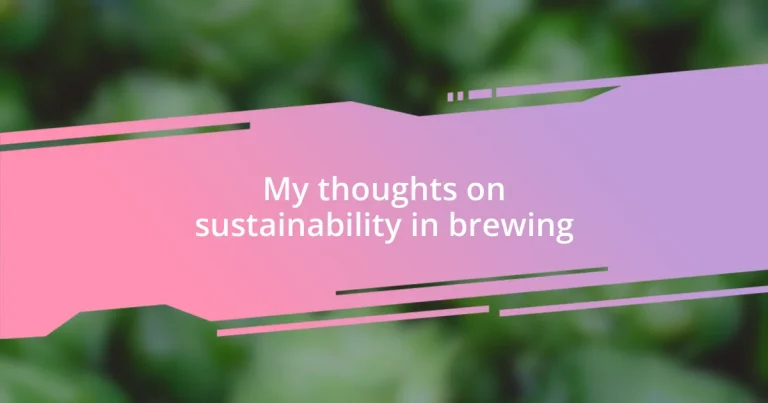Key takeaways:
- Sustainability in brewing involves resource conservation, local sourcing of ingredients, and the adoption of eco-friendly practices, benefiting both the environment and local economies.
- Key strategies include water conservation, energy efficiency, and innovative waste management, such as repurposing spent grains and using composting systems to minimize environmental impact.
- Future trends in sustainable brewing focus on upcycled ingredients, smart technology for optimizing resource use, and enhancing transparency by sharing sustainability efforts with consumers.
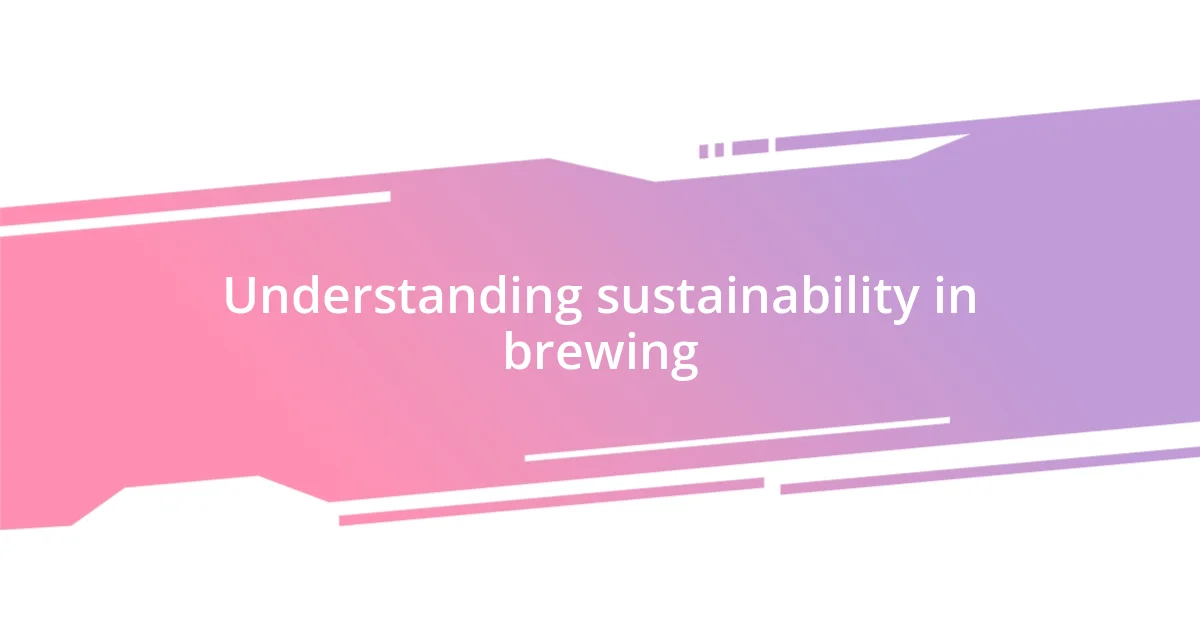
Understanding sustainability in brewing
Sustainability in brewing is not just a trend; it’s a vital approach to preserving resources while crafting beloved beverages. I remember visiting a local brewery that implemented a water recycling system. Seeing their commitment firsthand made me realize how much can be done at the grassroots level—every small step counts.
In my experience, the brewing process can be resource-intensive, often relying heavily on water and energy. When I learned about breweries choosing renewable energy sources, it felt like a breath of fresh air. Have you ever considered how much energy it takes to create your favorite pint? It’s eye-opening to think about how much impact we can have if more brewers adopt these environmentally friendly practices.
Moreover, sustainability isn’t just about resource management; it also encompasses the ingredients used. For example, sourcing local hops reduces the carbon footprint while supporting local economies. I often wonder, when we choose to drink sustainably produced beer, are we not just choosing a flavor but also a healthier planet? Embracing these practices in brewing can create a win-win scenario for both consumers and the environment.

Importance of sustainable practices
Sustainable practices in brewing play a crucial role in protecting our planet’s resources. I once had a conversation with a brewer who emphasized the ripple effect of these practices, stating that the more sustainable choices they make, the more influence they can have on others in the industry. It struck me how interconnected we all are; one brewery’s commitment can inspire countless others, fostering a collective movement towards sustainability.
- They help conserve vital resources like water and energy.
- Sustainable practices can lead to cost savings in the long run.
- By implementing eco-friendly methods, breweries can enhance their market appeal.
When I reflect on the impact of sourcing ingredients locally, it leaves me with a sense of hope. I remember chatting with a farmer who supplied a community brewery with organic grains. The pride in their voice was evident when they spoke of how their partnership not only enriched their community but also diminished their ecological footprint. It’s moments like these that remind me how sustainability isn’t just a practice; it’s a lifestyle choice that brings people together for a healthier planet.
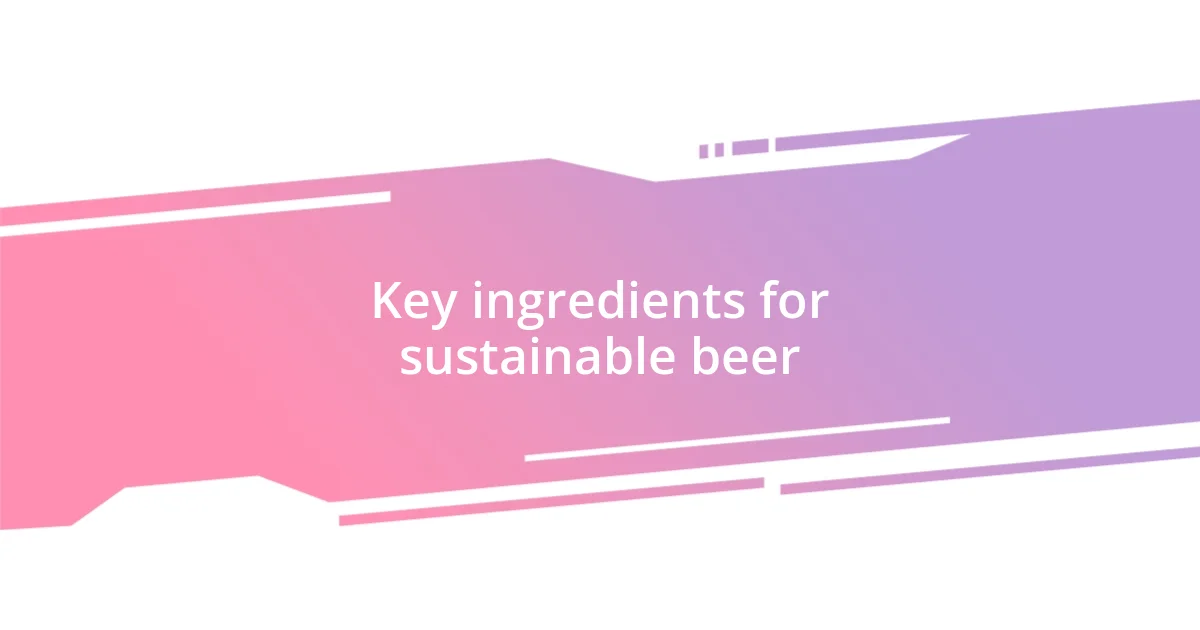
Key ingredients for sustainable beer
When it comes to the key ingredients for sustainable beer, I can’t help but think about the importance of using organic grains. Recently, I tried a beer made from organic barley sourced from a local farm. The flavor was vibrant and unique, a testament to how those grains were cultivated without synthetic pesticides or fertilizers. It’s remarkable how such choices not only enhance the brew’s taste but also promote healthier soil and ecosystems.
Hops also play a critical role in sustainable brewing. I remember visiting a hop farm where the farmer practiced crop rotation and biodiversity. The hops grown there were not only aromatic but also nurtured in a way that reduced the need for chemicals. When we support such methods, I believe we’re not just indulging in a delicious drink; we’re celebrating a way of farming that respects nature.
Lastly, I’ve learned that water quality and sustainability are inextricably linked in brewing. There’s something special about a brewery that prioritizes clean, purified water sourced responsibly. I once enjoyed a pint from a place that invested in water filtration technologies, which added a smooth texture to the beer. These choices reflect a brewery’s commitment to both the craft and the environment, underscoring how the ingredients we choose can create a ripple effect for sustainability.
| Ingredient | Benefits |
|---|---|
| Organic Grains | Enhances flavor and promotes healthier ecosystems. |
| Local Hops | Supports biodiversity, reducing reliance on chemicals. |
| Purified Water | Improves beer quality while ensuring responsible sourcing. |
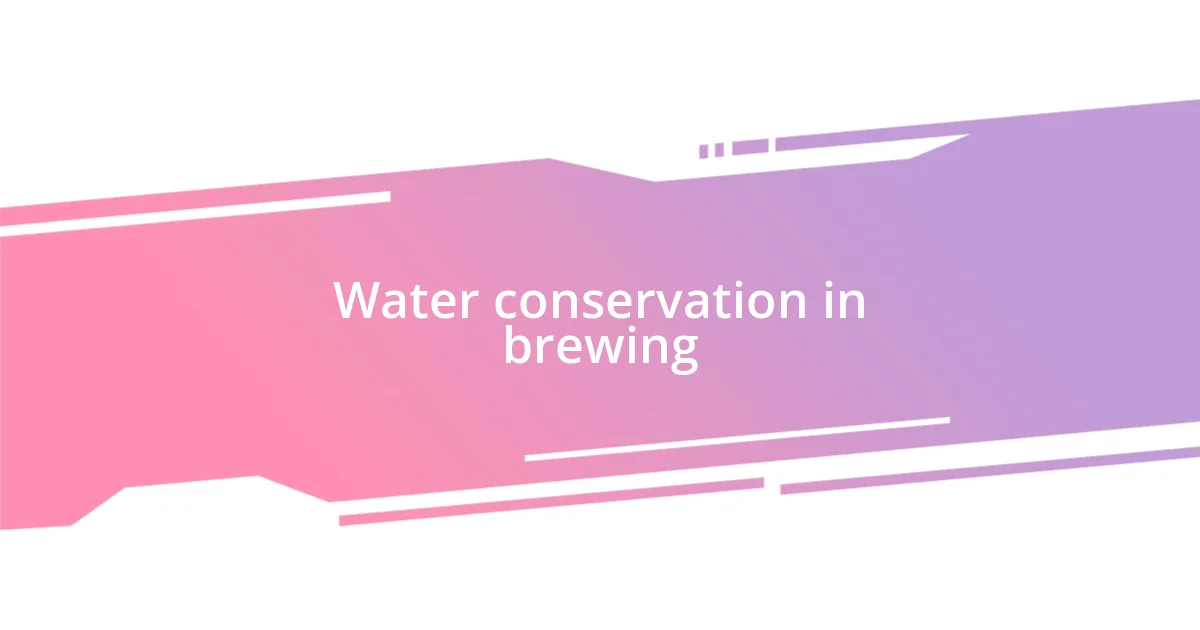
Water conservation in brewing
Water conservation in brewing is a topic that resonates deeply with me. I recall visiting a small brewery nestled in a valley where they had implemented a rainwater harvesting system. Seeing those massive barrels filled with rainwater, ready to be used in the brewing process, filled me with admiration. It’s a simple yet effective way to reduce their reliance on municipal water supplies. How many breweries are aware of the potential right above their heads?
In my experience, the brewing process can consume a staggering amount of water. I once spoke with a brewer who had revamped their approach by recycling water in their cleaning processes. They shared how this change not only led to remarkable savings on their water bill but also significantly reduced their environmental impact. It’s empowering to know that taking such steps isn’t just good for the planet; it can also yield real financial benefits for breweries.
Moreover, I think about the broader implications of water use in brewing. Water quality affects everything from consistency in taste to the overall health of the brewing process. I remember trying a lager from a brewery that emphasized their commitment to water conservation, and it was clear they understood this connection. Each sip was a reminder that when we prioritize sustainable practices, we’re not just preserving a resource; we’re enhancing the craft itself. Isn’t that a worthy goal for anyone involved in brewing?
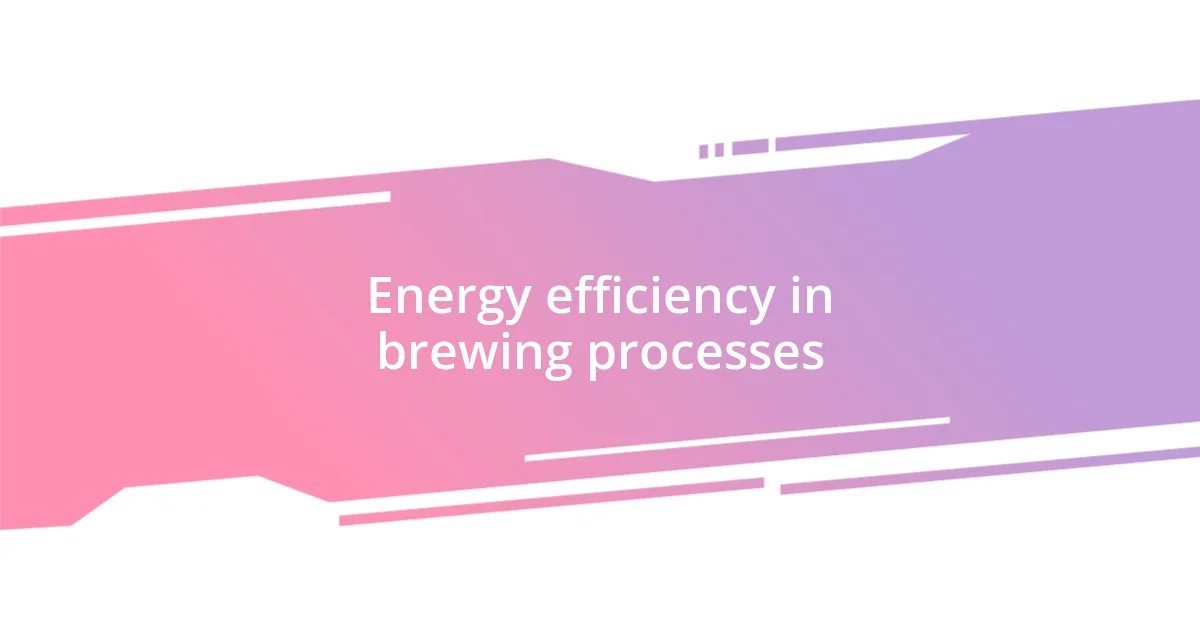
Energy efficiency in brewing processes
Energy efficiency in brewing processes is something that truly fascinates me. I remember attending a workshop at a brewery that had recently invested in state-of-the-art energy recovery systems. The owner showcased how they captured excess heat from the brewing process to preheat their incoming water. It’s incredible to think about how a single adjustment can lead to substantial energy savings—transforming waste into a valuable resource.
Another aspect that stood out during my visits to different breweries is the shift towards using electric heat sources instead of traditional gas boilers. I watched as one brewer proudly explained how this change cut down not only on emissions but also on their overall energy costs. It’s eye-opening to see how these technological evolutions can make craft brewing more sustainable while still preserving the integrity of the beer.
Lastly, I often ponder the role of onsite renewable energy solutions in the brewing world. A friend of mine is running a small brewery that recently installed solar panels. They’ve found not only that energy costs have significantly decreased, but they also share their journey on how this has resonated with their customers. What could be more rewarding than knowing that each pint poured is powered by the sun? In my mind, this is the future of brewing—one where innovation and sustainability go hand in hand.
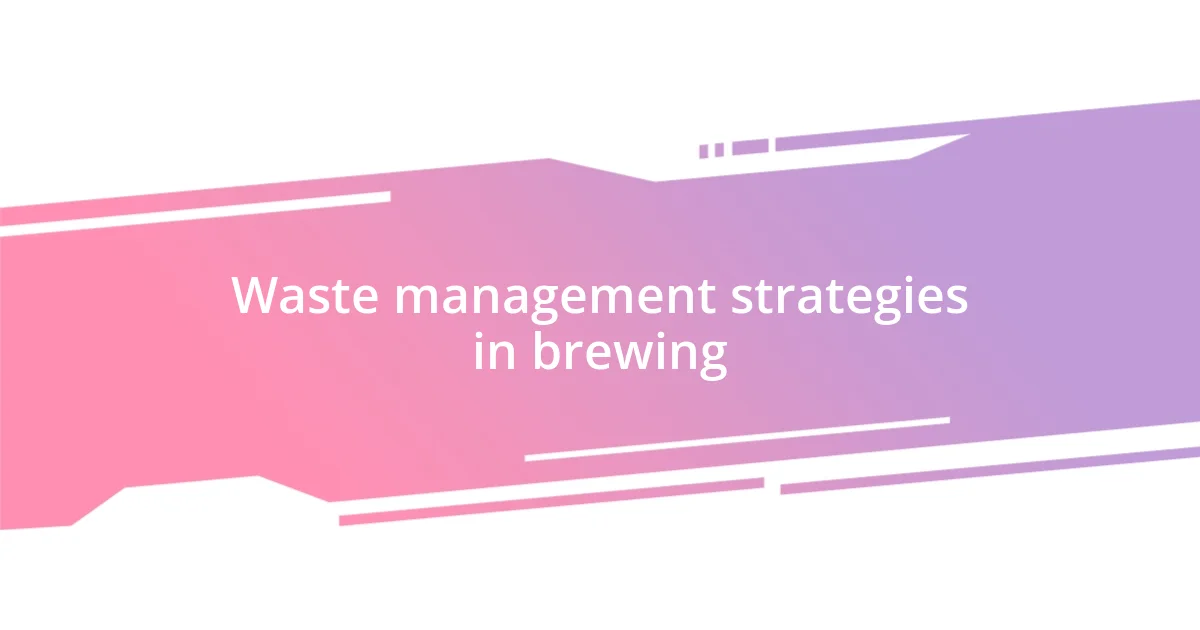
Waste management strategies in brewing
Waste management strategies in brewing play a crucial role in minimizing environmental impact. I once visited a brewery that transformed its spent grains into animal feed, establishing a local partnership with a nearby farm. Watching the brewer exchange those grains with the farmer was a poignant reminder of how circular economies work—waste isn’t just discarded; it can nourish life if we think creatively.
One of the standout strategies I encountered was the implementation of composting systems. It was inspiring to see a brewery that turned not only their hop waste but also the leftover yeast from fermentation into rich compost for local gardens. This not only reduced what ended up in landfills but also enriched the soil, closing the loop between brewing and agriculture. It made me think: how many other industries could benefit from such a simple yet impactful solution?
I often reflect on the importance of creating awareness around waste segregation in brewing. At one brewery, I noticed clear labels for recycling and composting right next to their waste bins. I felt a surge of pride—this was not merely compliance but an active engagement with sustainability. Could these small changes inspire fellow brewers to adopt similar practices? It’s these shifts in mindset that can lead to lasting change in our industry.
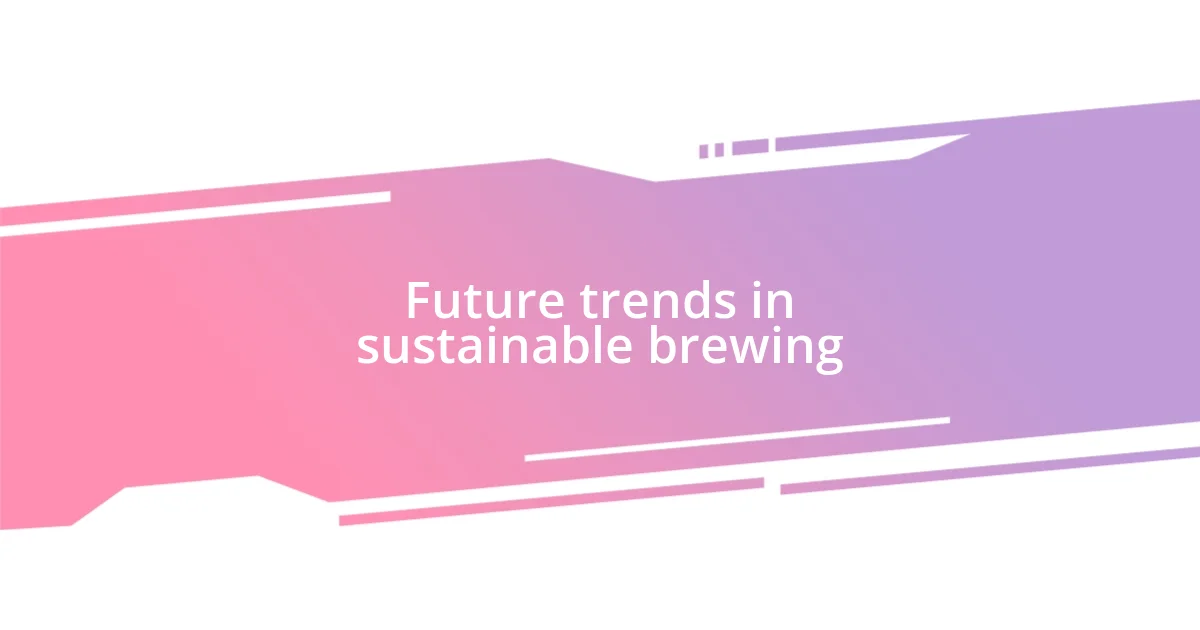
Future trends in sustainable brewing
One of the fascinating future trends I see in sustainable brewing is the move towards upcycled ingredients. During a recent tasting event, I tried a beer made from leftover fruit that would otherwise have been discarded. It sparked a realization: using such ingredients not only enhances flavors but also reduces waste. Could this be a new favorite trend among craft brewers, where creativity meets sustainability?
Additionally, the integration of smart technology in brewing processes is something I can’t help but get excited about. At a brewery tech expo, I witnessed a demo of a system that uses data analytics to optimize water usage. The brewer shared that they now track every drop—literally! This precision not only conserves water but also enhances the quality of the final product. How many other brewers are ready to embrace digital solutions to create a more sustainable future?
Finally, there’s an emerging emphasis on transparency and storytelling in sustainable brewing. I remember chatting with a brewer who spoke passionately about sharing their sustainability journey with customers. They realized that patrons appreciate knowing where their beer comes from and the sustainability efforts at play. It’s something I believe will resonate more in the future. How powerful would it be if every bottle of beer told a story of care for the planet?












